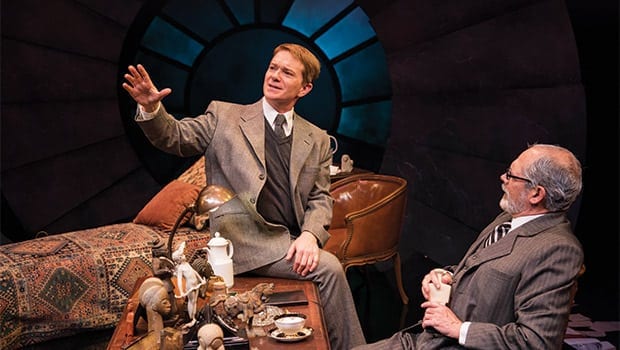
Director Jim Petosa pulls off the impossible in “Freud’s Last Session,” playing at the New Repertory Theatre in Watertown through May 22. With wit and humor, the play takes two of the 20th century’s greatest academic minds, Sigmund Freud and C.S. Lewis, and makes both the men and their philosophies accessible. The 75-minute show features a debate between the two against the backdrop of the Nazi invasion of England.
Freud, played by Joe Colodner, has invited C.S. Lewis (Shelley Bolman) to his home in an attempt to understand, and perhaps undermine, his Christian beliefs. Both characters are given humanity in brief bits of backstory, Lewis for his PTSD from serving in WWI and Freud from the mouth cancer that is slowly killing him. The minimalist plotline doesn’t hinder the production. In fact, as Freud says, “Things are simple only when you choose not to examine them.”
If you go
”Freud’s Last Session” is playing at The Arsenal Center for the Arts in Watertown, MA until May 22.
Bolman produces an excellent Lewis, a lively, idealistic foil to Freud’s logical cynicism. But it’s Colodner who makes the show with a Freud that is at once fiercely proud, stubborn, and intellectual, and also wounded, guarded, and ultimately, afraid. Mark St. Germain’s witty dialogue keeps both actors on their toes, with Lewis giving his share of analysis on Freud, and sharp one-liners coming from both sides. Their relationship progresses throughout the show from intellectual enemies to unlikely friends.
The only flaw of the performance, and it is perhaps unavoidable given the subject matter, is the exclusionary quality of it. It’s a portrait of upper class, white intelligentsia. The characters only reference white male authors such as Milton, Tolkien and Chesterton. Despite this, the questions they grapple with — is there a God? What happens after death? Is there such thing as innate morality? — apply to all walks of life. To his credit, Freud does bring a dose of contemporary liberalism to the piece when he advocates for bisexuality and personal freedom.
In light of the historical context, much of the debate is centered on the meaning of death. Freud argues that there is no afterlife, and that the choice to die belongs to each individual, not to a higher power. Conversely, Lewis believes only God can take life and that heaven or hell awaits humanity afterwards. These philosophies are underscored by the events of the characters’ lives. Lewis uses a higher power to justify watching his friends die in the war. Freud wants to have control of his life, despite the disease that dictates his death.
Near the end of the play, Freud is reduced to lying on the couch in horrendous pain from the cancer in his mouth. Lewis stands by, helping as he can. Throughout the show the couch is used as a weapon of power. Whoever sits on it is being analyzed, while the analyzer, elsewhere, has all the control. In the end the power symbol, and the debate, is neutralized. The couch has become the bed of a dying man and the two enemies are equalized by their mortality — no matter the reason for it.







